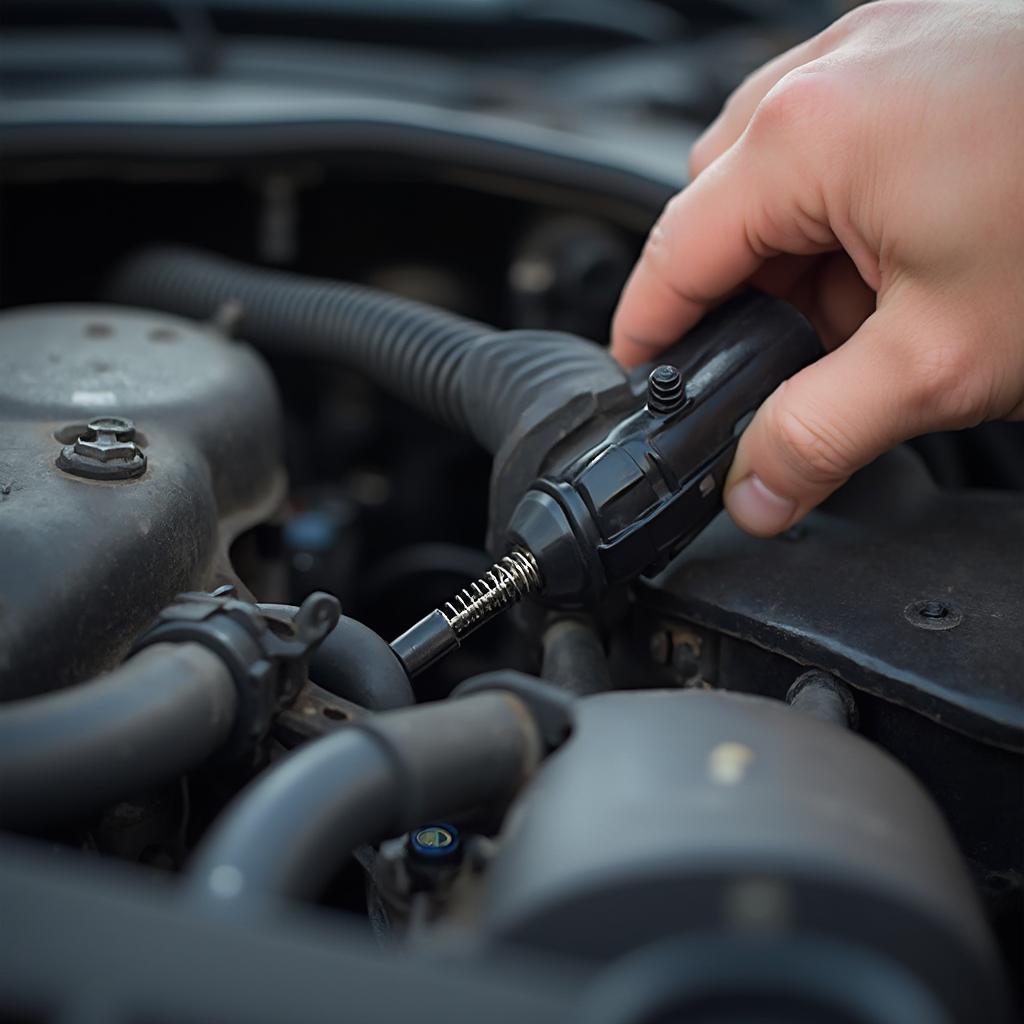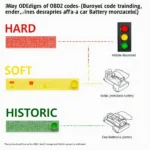The OBD2 P0171 code, indicating a “System Too Lean (Bank 1)” condition, is a common issue that can plague vehicle owners. This code signals that the engine’s air-fuel mixture is too lean, meaning there’s too much air compared to fuel in the first bank of cylinders. Understanding this code is crucial for effective troubleshooting and repair.
The P0171 code can manifest in various ways, from a slight decrease in fuel efficiency to more serious problems like engine misfires or damage to the catalytic converter. Ignoring this code can lead to costly repairs down the line, so it’s essential to address it promptly. This article will delve into the causes, symptoms, diagnostic procedures, and solutions for the OBD2 P0171 code, empowering you to tackle this issue head-on.
What Does the P0171 Code Mean?
The “System Too Lean (Bank 1)” message signifies an imbalance in the air-fuel ratio. An ideal air-fuel mixture is crucial for optimal engine performance and emissions control. When the mixture becomes too lean, the engine receives less fuel than required, resulting in reduced power output and potential damage to internal components. “Bank 1” refers to the side of the engine containing cylinder number one.
What are the common symptoms of a P0171 code? Symptoms can include rough idling, hesitation during acceleration, reduced fuel economy, and a check engine light.
Common Causes of the P0171 Code
Several factors can contribute to a lean condition, triggering the P0171 code. These include:
- Vacuum Leaks: Leaks in the intake manifold, vacuum hoses, or other components can introduce unmetered air into the engine, disrupting the air-fuel ratio.
- Faulty Mass Air Flow (MAF) Sensor: The MAF sensor measures the amount of air entering the engine. A malfunctioning sensor can provide incorrect readings, leading to an improper air-fuel mixture.
- Malfunctioning Oxygen (O2) Sensors: O2 sensors monitor the oxygen levels in the exhaust gases. Faulty sensors can send inaccurate signals to the engine control module (ECM), affecting fuel delivery.
- Fuel Injectors: Clogged or leaking fuel injectors can restrict or disrupt fuel flow, causing a lean condition.
- Fuel Pressure Problems: Low fuel pressure, often caused by a failing fuel pump or clogged fuel filter, can starve the engine of fuel.
Diagnosing the P0171 Code
Diagnosing the P0171 code requires a systematic approach:
- Check for Vacuum Leaks: Inspect vacuum hoses and the intake manifold for cracks or leaks. Use a carburetor cleaner to spray around suspected areas while the engine is running. A change in engine speed indicates a leak.
- Inspect the MAF Sensor: Check the MAF sensor for dirt or damage. Clean the sensor with a specialized MAF sensor cleaner.
- Test the O2 Sensors: Use a multimeter to test the O2 sensor voltage readings. Compare the readings with the manufacturer’s specifications.
- Check Fuel Pressure: Use a fuel pressure gauge to test the fuel pressure. Compare the reading with the specified pressure for your vehicle.
- Inspect Fuel Injectors: Check for clogged or leaking fuel injectors. A professional fuel injector cleaning service may be necessary.
Fixing the P0171 Code
Once the cause of the P0171 code has been identified, the appropriate repair can be made. This might involve replacing faulty components, such as the MAF sensor, O2 sensors, fuel injectors, or fuel pump. Repairing vacuum leaks is also a common solution. In some cases, software updates to the ECM may be necessary.
“Regular maintenance is key to preventing many OBD2 codes, including the P0171,” says John Smith, Senior Automotive Technician at Acme Auto Repair. “Keeping your engine properly tuned and addressing minor issues promptly can save you a lot of trouble in the long run.”
Conclusion
The OBD2 P0171 code, signifying a lean fuel mixture, can be effectively diagnosed and repaired with a systematic approach. Understanding the potential causes and following the diagnostic steps outlined in this article will empower you to address this issue and restore your vehicle’s optimal performance. Don’t ignore this code – taking prompt action can prevent more serious problems and save you money on costly repairs down the line. Addressing the P0171 code ensures your vehicle runs smoothly and efficiently.
po171 chevy code fixed with obd2 software addon
FAQ
- What does a P0171 code mean? It indicates a lean air-fuel mixture in engine bank 1.
- Can I drive with a P0171 code? It’s not recommended as it can cause further damage.
- How do I fix a P0171 code? Diagnose the root cause (vacuum leaks, faulty sensors, etc.) and replace the faulty component.
- What are the symptoms of a P0171 code? Rough idling, hesitation, reduced fuel economy, check engine light.
- How much does it cost to fix a P0171 code? The cost varies depending on the cause and required repairs.
- Is the P0171 code serious? If ignored, it can lead to catalytic converter damage and other engine problems.
- How can I prevent a P0171 code? Regular maintenance and timely repairs are key to prevention.
Common Scenarios for P0171 Code
- Scenario 1: Car hesitates during acceleration and has rough idling. Possible cause: Vacuum leak.
- Scenario 2: Check engine light is on and fuel economy is reduced. Possible cause: Faulty MAF sensor.
- Scenario 3: Engine misfires and runs rough. Possible cause: Faulty fuel injector.
Further Exploration
For further information on other OBD2 codes and car maintenance tips, explore other helpful articles on our website. You can find resources on various topics related to car diagnostics and repair.
For any assistance or inquiries, please contact us via WhatsApp: +1(641)206-8880, Email: [email protected] or visit our office at 789 Elm Street, San Francisco, CA 94102, USA. Our customer support team is available 24/7.


